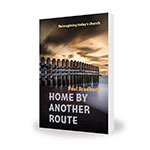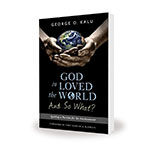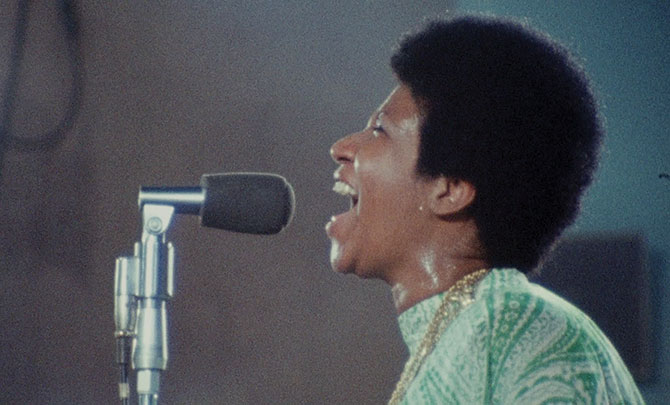Reviews – May 2019 - Reform Magazine
Soul music
Amazing Grace
Directed by Alan Elliot and Sydney Pollack
Certificate PG, 87 minutes
Released 10 May
January 1972. The soul singer Aretha Franklin, an artist at her creative peak, decides to record an album of gospel music in the New Temple Baptist Mission church in Los Angeles. Before she became a successful soul artist in the 60s, Aretha sang gospel in churches. Her father, the Revd CL Franklin, was a minister in Detroit.
The two nights’ recordings became the highest selling album of her career. Sydney Pollack’s cameras were present but for technical reasons, no film of the event was released. Until now.
Unlike the album, which cleaned up and rerecorded parts of the performance, the film is raw. What those who were there heard and saw on the two nights is what you get (although its 87 minutes is cut down from Elliot’s original cut of three hours plus). The images are very grainy yet the music transcends that limitation. The film makes you feel like you’re actually there.
There are no talking heads or additional background to the two days’ performance and shoot, and nothing at all about why the film never came out. Aretha Franklin is going to church for two nights to sing to her Lord and that’s what’s presented.
Aretha hardly speaks throughout the peformance: when she does, she acknowledges the gospel-singing greats Clara Ward, who can be seen in the audience/congregation, and Mahalia Jackson at whose funeral both women would sing at the end of that January. Aretha’s father delivers a short and moving address. At the back of the church, occasionally picked out by the cameras, you can see Mick Jagger and Charlie Watts of the Rolling Stones (then in the middle of recording Exile On Main Street), having a good time listening, dancing and getting into the worshipful spirit of the proceedings.
Aretha’s vocal rendition of the songs is the thing – along with the backing choir. Aretha Franklin was an amazing gospel talent and your head will come out buzzing with gospel rhythms. That’s not to decry her considerable achievements as a soul singer one iota, but if I had to choose one Aretha Franklin performance to watch and listen to, this would be it. A little foretaste of heaven. Put the fact of its earthly appearance almost 50 years after the event down to the grace of God. Amazing indeed.
Jeremy Clarke is a film critic
___
Help with domestic abuse

Out of Control: Couples, conflict and the capacity for change
Natalie Collins
SPCK
£12.99
ISBN: 9780281078905
This is not an easy book to read. The style is very accessible but the subject matter of domestic abuse is hard. It is written gently, encouraging the reader to stop and take care of themself, and to be aware of the difficult content. It also encourages prayer (that is, if praying is your thing; the book is from a Christian perspective but isn’t just for Christians).
Out of Control is written out of a particular context: the experience of living through, and working with, domestic abuse perpetrated by men on women. However, the book acknowledges that this is not the only story, and the insights of the book are transferable to other situations. It is a deeply reflective book that comes from a place of deep knowing.
Each chapter explores essential questions including how and why, theological and biblical reflections, help, hope and coping, transformation, why someone doesn’t ‘just leave’. There are appendices: signposting, resources, a safety plan for those planning to leave an abusive relationship, and a feelings word sheet to help with discussion. You could just dip in and out of this book, but as the author says, those affected by abuse deserve more than just a chapter of our time.
Out of Control would be a good and important book for all sorts of people: those who offer pastoral care, those who have found their lives caught up in domestic abuse, those who discover they have a friend who is in that place, those who feel totally ignorant on this subject, and those who want to understand more about it. It would also be good for those who are at the receiving end of abuse; if you are in that situation, this book will be an affirming and hopeful read. I imagine that Out of Control would also be good for a group of pastoral carers to get a conversation going about the nature of pastoral care in very difficult places. The book ends with hope – not that we will end domestic abuse, but that we will create a society that reduces the space for it, so that it is no longer tolerated and those on the receiving end will be believed.
Anne Sardeson is Training Officer for the United Reformed Church Thames North Synod
___
New ways for churches

Home by Another Route: Reimagining today’s Church
Paul Bradbury
The Bible Reading Fellowship
£7.99
ISBN: 9780857466310
Paul Bradbury is an Anglican pioneer minister who started a fascinating fresh expression in Poole – a missional community called ‘Reconnect’ that is living out a new way of being Church. He therefore brings a wealth of on-the-ground experience to the topic of ‘reimagining today’s Church’.
This is a misleadingly thin book, as the content is anything but thin! It’s heart is an in-depth analysis of the exilic period, with a particular focus on Ezekiel’s vision of the dry bones in Ezekiel 37. From this detailed biblical and historical analysis, Bradbury draws parallels with the context the Church finds itself in today. As Christian communities, we are also in exile, often looking back longingly and trying to recreate and maintain our old ways in a foreign land. We are often either in despair at the loss of the past, or looking to some kind of assimilation. Bradbury maintains that we need to see the creative opportunities that our present context offers us, as we allow the Spirit to work through us in new and exciting ways.
The phrase ‘home by another route’ comes from the story of the journey of the magi in Matthew’s Gospel. The magi do return home, but they are changed by their encounter and return by another route. The Church is also called to ‘return by another route’, we cannot simply try to do the old things better, we need to find another route. Bradbury rightly claims that ‘recreating Jerusalem in the landscape of Babylon is not an option’.
As someone who is part of a community that is seeking to reimagine the Church, I was very much drawn to the topic. But this is not a practical ‘how to’ book, it is one to take time with, to chew over, to re-read. It is not a book for someone looking for simple answers on how to reimagine the Church today. This is a book for those who are prepared to think deeply and theologically about the context in which we find ourselves, and to look to the wealth of biblical tradition for wisdom and inspiration.
Ruth Maxey is a pioneer minister at Church without Walls, Milton Keynes
___
Environmental theology

God So Loved the World. And So What?: Igniting a passion for the environment
George O Kalu
Self-published
£9.99
ISBN: 9781999307905
In the face of an accelerating global environmental crisis, it is not that all roads lead to Rome; rather, all theological streams, when confronted by eco catastrophe, lead to radical incarnationalism – the realisation that the biblical obsession with the integrity of the created order imparts an unprecedented purpose and passion to the diverse faith we share. George Kalu, though full of a sense of duty and obligation, makes a case for theology to be practical and dynamic, rather than archival. He maintains that a conservative or evangelical churchmanship is no excuse for the aberrations of inaction or aloofness.
The weakness and strength of the book is that it is a recycled doctoral thesis; it might serve as a highly-referenced primer on the relevance of environmental issues to mainstream-to-conservative theology. The book contains a well-argued programme for Kalu’s original Church, the Presbyterian Church of Nigeria, to retrain, rethink liturgy, and reform its structures. Dr Kalu clearly has some formidable theological battles to fight within the Nigerian Churches, most of which are not so significant for the UK except perhaps institutional inertia.
Kalu’s extreme wariness of syncretism and pantheism is clearly based on sharp experience. Prosperity gospel movements, with their emphasis on personal salvation and other worldliness, encourage Nigerians to disconnect their theology from a world groaning in pain and damaged by human sin. This is brutally evident in environmentally lethal and socially exploitative fossil fuel industries in the Niger Delta. But – since sin is what causes social and environmental harm, not only in Nigeria, but globally too – the book’s narrative of the fallenness of humanity and a cursed earth is not only coherent but relevant to all.
The author has immense gratitude for the sacrificial, visionary efforts of Scottish missionaries, but offers a surprisingy trenchant critique of ‘stewardship’, which has hitherto provided a middle-of-the-road theological vehicle for churches to take note of environmental issues. If you’re struggling to find a place and purpose for your own church context in climate crisis, it’s good to know you’re not alone.
David Coleman is Environmental Chaplain for Eco Congregation Scotland
___
Sharing faith with your grandchildren

Faithful Grandparents: Hope and love through the generations
Anita Cleverly
The Bible Reading Fellowship
£9.99
ISBN: 9780857466617
This book is a gem. I read it quickly, because it is hard to put down, and I shall immediately read it again more slowly, to savour the wisdom that’s on every page. The title tells you what it’s about: encouragement for grandparents to share their faith with their grandchildren.
Anita Cleverly is an experienced spiritual director and bereavement counsellor. Her sensitivity undergirds the wise words in every chapter. Never does she forget that we have our grandchildren on loan, and that discipline and criticism, however gently applied, are not our lot.
The first two chapters of the book survey what grandparenting really is, in our time and culture, recognising the different situations that many grandparents find themselves in. Many grandparents are left with very limited opportunities to build the relationships which permit the sharing of faith stories. There are useful suggestions for grandparents who have little contact with their grandchildren to make the most of the possibilities.
Several chapters help us to identify the essentials of our own faith, and ways in which they could be put over. One uses the Apostles’ Creed to help us focus. There are chapters on the Church and on the problems facing people of faith in an increasingly secular world, as well as one on the contentious issues facing Christians.
Subjects like human sexuality are dealt with gently and sensitively. We are encouraged never to pontificate but to accept our grandchildren’s choices with grace and love.
The book is full of apposite quotations from the Bible and other Christian writers. It is very easy to read, the writer having the wonderful gift of being able to speak apparently straight to the individual reader. There are anecdotes galore, both funny and sad.
I am genuinely looking forward to reading this a second time, and wholeheartedly commend it to any grandparent. Your grandchildren will be much blessed through it.
Ruth Allen is a retired United Reformed minister based in Ilkeston, Derbyshire
___
Musical tribute to the Church’s prophetic voice

A Turbulent Priest
Written by James Cary
On tour in the UK
(see www.aturbulentpriest.com/tour-dates)
Until 11 May
The first half of A Turbulent Priest does everything you expect of it with aplomb, charting the rise of Thomas Becket from his lowly origins to becoming Archbishop of Canterbury, with jokes and songs aplenty. We learn some genuinely surprising facts about the priestly ingenu from Merton, such as he didn’t speak Latin when he became head of the Church, and that he was also an able diplomat from early on, a trait which turned out to be a double-edged sword…
The writing is clever and succinct, managing to pack in facts alongside Becket’s trajectory. There is some winking to Brexit and the expenses scandals, and the significance of Church and state judicial systems – all without feeling dense or slow. In style, it has sprinkles of panto, vaudeville, Blackadder and Horrible Histories, while maintaining its own voice.
James Sherwood’s musical contributions serve both as narrative drivers and character introductions. Some are genuine gold. ‘Best of Friends’ – a duet between the King and Becket, stands out as capturing the complexities of their bromance with lyrical glee, after which I felt like I’d watched a menacing reimagining of The Jungle Book’s ‘Bare Necessities’. This was trumped narrowly by the legal rap battle, ‘State v Church, Church v State’ set to Eminem’s ‘Lose Yourself’.
Hats off to James Cary – who is writer, director, producer and (at least in this venue) lighting technician – for casting a woman as the title role (Thomas Becket). Anna Newcome delivers a sprightly naivete to the character, suggesting humorously how Becket might have been coerced into becoming both Lord Chancellor and Archbishop of Canterbury simultaneously – positions with definite conflicts of interest. Her portrayal of the man who faces up to his duty and eventual death in defending the Church’s rights, is an earned shift of tone from the jovial first half, supported by the vulnerability she brings.
Johnny Fairclough covers several supporting roles, including the ever-loyal John of Salisbury, a beneficent Archbishop Theobald and a cockney-geezer-style St Thomas the doubter. But Fairclough comes into his own as Henry II, hilariously conveying the king as petulant and unpredictable. As a two hander, the actors have their work cut out playing a large cast of clergy and courtiers. For my part, I would have loved to have seen the physical performances amped up to reflect the shifting personalities and hierarchies.
It’s clear that Cary sees Becket’s story as a Christian narrative, and he argues that ‘Christians need to tell our stories to maintain our heritage.’ This work is also a cry to the Church to keep her ‘prophetic voice’ and to stand up to the state when it attempts to bully her into acquiescence. From the parallels he draws between Henry and Satan, and Becket and Christ, in a scene akin to Jesus’ temptation in the desert, Cary reinforces what the implications will be if the Church fails to keep that prophetic voice. This message will no doubt resonate with many.
Kate Mounce co-runs the faith-based clown theatre company Beside Ourselves Collective (@BsideRselves). She also performs with the burlesque troupe Invisible Cabaret (@inviscabaret)
___
These reviews were published in the May 2019 edition of Reform














Submit a Comment